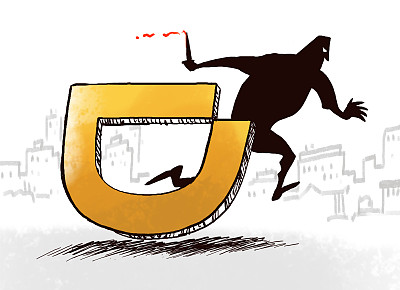
China's ride-hailing giant Didi Chuxing is back in spotlight once again, but not due to good news. A ''hitch'' service driver is suspected of killing a female passenger, creating an online public uproar.
If we merely focus on this tragic incident, we might conclude that the platform has not done enough housekeeping to screen its drivers. However, if we take a closer look, we will see that the company has barely made customers its business priority across the board.
After offering a reward of up to 1 million yuan ($160,000) to anyone with information on the driver suspected of murdering an airline stewardess in Zhengzhou, Central China's Henan Province, Didi Chuxing signaled its contritions on Friday by suspending its ''hitch'' service nationwide, starting from May 12, for one week of internal rectification.
The platform doesn’t need a better public relations strategy. It needs to improve its efficiency and service.

Photo: VCG
From service provider to gold miner
As China’s major ride-hailing platform, Didi Chuxing has been too busy burning investors’ money to care about the real stakeholders – customers — or consider what customers might need as they use the services.
An enterprise must be a corporate citizen before it earns a penny. Corporate citizens have social responsibilities, such as protecting customers’ security, privacy and property rights.
Meanwhile, the company has not put enough time and energy into responding to customers’ complaints during its rapid expansion. For example, many passengers have to wait more than half an hour before securing a car. Some aged customers cannot understand the complicated user interface.
When it’s late at night or during peak hours, the company’s backend system appears to be designed to force riders choose to pay extra money to get a car.
Monopoly leads to inefficiency
Some critics accuse Didi Chuxing of being a monopoly.
According to China's Anti-Monopoly Law, when an industry player’s market share surpasses 50 percent, it can be presumed that the operator has the dominant position.
Didi Chuxing accounts for 93 percent of the market share. No wonder it is facing wide-spread criticism.
The law also stipulates that the abuse of a dominant market position is not the only criterion for identifying a monopoly. So the question of whether Didi Chuxing is a monopoly is still open.
The platform needs to focus on the interests of consumers, constantly improve its technology, optimize the allocation of resources, and accelerate the response speed of the product, to provide better travel experiences rather than simply retain users through price wars.
During a price war, users can get preferential treatment. However, there are two problems with this kind of competition. First, to win a price war, the platform might cut corners on screening drivers, leading to a potential security risk. Second, in the long run, once any party gains a monopoly or dominant market share, consumers’ interests will be compromised.
No more loose ends
If Didi Chuxing or any other car-hailing platforms would like to put their business back to the right track, they might want to start with these five burning points.
How can platforms protect customers’ personal information, which might include users’ profile, car location, traffic route and family members? All such privacy needs better protection.
How can the platform ensure driving safety? How safe is the vehicle? Is its annual inspection on record?
How can the company unleash the benefits from technology such as big data?
Has the driver purchased commercial insurance, which covers customers? Basic insurance merely works for family use.
How does the platform manage drivers when customers complain about the service?
All these questions remain unanswered.
Bearing corporate social responsibilities in mind, Didi Chuxing needs to do more than offer discounted rides for a week to live up to its promises to its primary stakeholders — the customers.
If Didi Chuxing or any other car-hailing platforms would like to put their business back to the right track, they might want to start with these five burning points.
How can platforms protect customers’ personal information, which might include users’ profile, car location, traffic route and family members? All such privacy needs better protection.
How can the platform ensure driving safety? How safe is the vehicle? Is its annual inspection on record?
How can the company unleash the benefits from technology such as big data?
Has the driver purchased commercial insurance, which covers customers? Basic insurance merely works for family use.
How does the platform manage drivers when customers complain about the service?
All these questions remain unanswered.
Bearing corporate social responsibilities in mind, Didi Chuxing needs to do more than offer discounted rides for a week to live up to its promises to its primary stakeholders — the customers.


